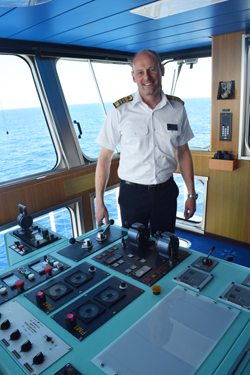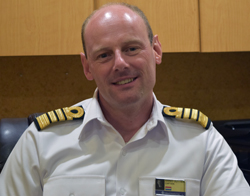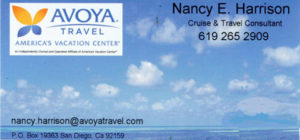Editor’s Note: This is the 26th in a series of stories researched during Don and Nancy Harrison’s 50th Wedding Anniversary cruise from Sydney, Australia, to San Diego. Previous installments of the series, which runs every Thursday, may be found by tapping the number of the installment: 1, 2, 3, 4, 5, 6, 7, 8, 9, 10, 11, 12, 13, 14, 15, 16, 17, 18, 19, 20, 21, 22, 23, 24, 25,
By Donald H. Harrison


AT SEA, Aboard MS Maasdam – Familiar with his father’s fire alarm business, Arno Jutten decided to go to electronics school. The fact that some of his friends were enrolling was another incentive. But spending “six hours a day learning about a single component” made Jutten’s mind wander to the Amsterdam waterfront and to the ships that sailed in and out of his city.
Not sure what else to do, Jutten completed the four years of electronics school. But he knew that was not the career for him. So, after some casting about, he decided that one of Holland’s nautical schools might lead to a far better career.
Indeed, it did. As part of his schooling, Jutten became a cadet with the Holland America fleet. He was impressed with the cruise line, and its executives with him, so that after his graduation, he was accepted as a junior officer. In the more than two decades since then, Jutten worked his way up through the ranks and served on 10 Holland America ships, captaining the 1,258-passenger Maasdam over the last five years.
Holland America Line has bigger and newer ships, which carry many more passengers, but Jutten says he really likes the 722-foot long Maasdam (which went into service in 1993) because it has more diverse itineraries than some of the larger ships. Seeing the world, and being paid to do it, were among the reasons that Jutten had decided to go to sea in the first place.
On a small ship that sails on longer cruises, with varying itineraries—as opposed to a larger ship that runs the same familiar routes week after week—“you get a lot of guests who come back, which is nice, because they interact with the crew, and get to know the crew,” Jutten said. “I think the smaller ships are a bit more personable.” Aboard Maasdam, he said, he makes it a practice to walk around the ship every day, stopping to talk with crew members and passengers as he goes. ‘I visit different areas of the ship every day,” he said. “I walk through the public areas a couple of times a day because that is where the guests are. But I also go around to talk to the crew maybe once a day. You can’t do the whole ship in one day. It would be exhausting. To talk to 570 crew members every day would be impossible.”
On larger ships, getting to know even more crew members would be doubly impossible.

“I think the crew gives the ship its personality,” Jutten suggested. “If you have a nice atmosphere among the crew, it means that new crew members will also get into that schedule and attitude. Most of the crew who serve on Maasdam want to come back, which means the atmosphere is good. A new ship has more bragging rights – ‘I’m the newest ship of the fleet,’ or ‘I’m the biggest ship of the fleet.’ This ship is old, but we have a very good itinerary, which is attractive to the crew, of course.”
Cruise ship personnel typically sign up for contracts lasting a specified number of months, then go on vacation, before signing up for another contract. Early in Jutten’s career, some of his friends stopped signing up for ocean-going voyages in favor of becoming port pilots, which allowed them to live at home. Jutten tried being a port pilot, but by the time a year had gone by, he was bored by the repetitiveness of it all. He longed for more variety in his life, but the trade-off was less time with his family.
Today, his seven-year-old daughter lives with his ex-wife, but sometimes she can join him on the ship when she has a school vacation. When he’s back on land, riding bicycles and going to the beach with her is a treasured opportunity.
He was asked during a question-and-answer session with passengers whether he had any favorite ports. He responded that he finds those in Asia particularly fascinating, not only for their beauty but also because the ports have so much traffic, calling upon his navigational skill. But, he added judiciously, there is beauty all over the world; so, he has many favorites.
Earlier in his career, when not yet a captain, Jutten served aboard the Holland America ship Amsterdam during an around-the-world cruise. Ashdod, Israel, was one of the ports that he visited, from which he made a quick trip to Jerusalem to see the Old City, one of the welcome opportunities that a career at sea affords him.
 “You will never be able to see so many places just going on holidays,” he mused. “Nobody has the money to do what I get to do earning a living – well, maybe some people do. The idea of traveling, meeting people from all over the world, going to beautiful places all the time – for the people back home, I am the mysterious sailor in the family. Nobody quite understands what our lives look like, so at home people always are interested in hearing our stories.”
“You will never be able to see so many places just going on holidays,” he mused. “Nobody has the money to do what I get to do earning a living – well, maybe some people do. The idea of traveling, meeting people from all over the world, going to beautiful places all the time – for the people back home, I am the mysterious sailor in the family. Nobody quite understands what our lives look like, so at home people always are interested in hearing our stories.”
There are three major departments on a ship. The first is the navigation department, consisting not only of the people who “drive” the ship, but also security, medical, communications, and deck crew. Day to day operations of this department are supervised by the ship’s staff captain. Another department consists of all the people involved in guest services, whether they be cabin stewards, cooks, waiters, bar men, entertainers, beauticians, casino personnel, fitness trainers, shop attendants, front desk personnel, shore excursion managers, art auctioneers, or the many people who work behind the scenes in such areas as provisioning, laundry services, and the like. All these crew members are under the supervision of the hotel manager. The third area is supervised by the chief engineer, running the engines, thrusters, propellers, communication arrays, and other moving parts of the ship.
The heads of all three departments report to Captain Jutten. “I don’t like to micro-manage,” he commented. “So instead of spending the whole day checking what everyone is doing, I respect everyone’s professionalism, and I try to stay out of everyone’s business as much as I can. I know if they need help they will come to me. I am quite easy to talk to. I don’t like to have barriers. As a person, I think that I am at the same level as every other crew member. I don’t feel more important than other people on the ship.”
“I think it is very important that you are accessible to everybody,” he added. “For me, I think the best thing is for the team to work together without me to interfere. I just step in if I need to. Of course, sometimes I have to, but we have a very good team at the moment. They work well together. We have meetings, of course, usually on issues that we need help from the (home) office. In general, the operation runs itself. It is a very well-organized machine, and it is nice to see.”
Does he ever feel that the ship would run perfectly fine without him?
“Sometimes I feel as a captain that the most important job is to make sure that everyone gets along, and once everyone gets along, you can solve almost any issue,” he responded.
“I let the junior officers drive the ship in and out of port because that is what we all like to do. It is the best part of our job on the bridge. Sometimes, very often, the staff captain is maneuvering, and the first officer is doing the communication, and I am just watching them do it. Of course, if someone has less experience, then I have to give them more input. It is nice to see the team grow, and sometimes I joke, ‘Wake me up after arrival.’ That never happens, of course, but if everyone does their job, then I have a very easy life. Of course, every now and then, I have to step in.”
At noon every day, Jutten comes over the Maasdam’s public address system to announce the ship’s position, the depth of the seas, the expected time and date of arrival at the next port, anticipated weather conditions, and other such information. Passengers frequently spot him strolling the deck and are not hesitant to engage him in conversation. There also are more formal occasions, such as the Captain’s gala dinner, or luncheons for repeat passengers at which Jutten will share a few ceremonial words. If, as he suggests, cruises on a smaller ship after a while feel like a family get-together, then for many younger passengers, he is a father figure. For the many of us who are much older than he is, Jutten is an outstanding career officer, of whom any family could be proud.
*
Harrison is editor of San Diego Jewish World. He may be contacted via donald.harrison@sdjewishworld.com
Pingback: Moorea, land of Moana and UC field studies | San Diego Jewish World
Pingback: Guide shares the Happe- ness of travel | San Diego Jewish World
Dear Mr Donald Harrison,
We just read your nice article about Captain Arno Jutten of the Maasdam.
Your last remark about him is that any family could be proud of this officer.
Well, we as his parents sure are! And your article made us even more so!
Kind regards,
Frank and Maïa Jutten